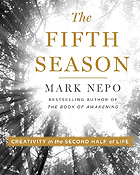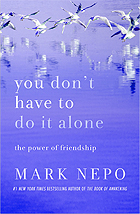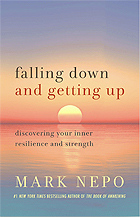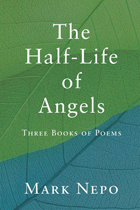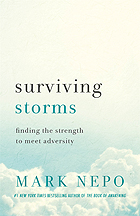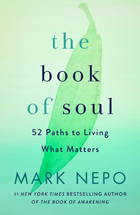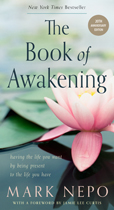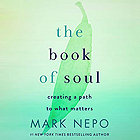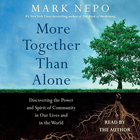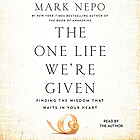| Books |  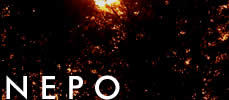  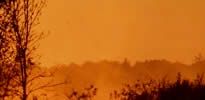 |
|
Finding Inner Courage Conari Press, 2011 (originally published as Facing the Lion, Being the Lion, 2007) (web link) Order from an online bookseller:
Amazon
Meeting Life with Courage, with Mark Nepo from Sounds True on Vimeo. BOOK DESCRIPTION The word courage comes from the Latin, cor, which literally means heart. The original use of the word courage means to stand by one’s core. This is a striking concept that reinforces the belief found in almost all traditions that living from the Center is what enables us to face whatever life has to offer. This book is an exploration into how to find our way to our core, to stand by our core, and to then sustain the practice of living from our core—to live out of our courage. To encourage means to impart strength and confidence, to inspire and hearten. So, the question unfolds: How do we encourage ourselves, each other, and the world? And just what does it mean to live a life of encouragement? If to find our way to our core is to face the lion, then to stand by our core is to be the lion. And to sustain the practice of living from our core—to live out of our courage—is to find our way in the world by tracking inner courage and where it lives. These notions frame the journey of this book. The courage we all admire, where ordinary people summon unexpected strength to run into burning buildings or to stand up to tyrants, whether an abusive father or an abusive leader, this inspiring and mysterious impulse to rise to a dangerous situation, which Hemingway referred to as grace under pressure, grows from another kind of courage—inner courage. By inner courage, I mean the ground of quiet braveries from which the more visible braveries sprout. These are the ways of living and being that make bravery possible in the first place; not just as an event, but as an approach to life, as a way of life. This book is devoted to exploring those quiet braveries, in an effort to understand not only what constitutes courage in its deepest sense, but what is the soil in which it is seeded, watered, cared for, and grown. Thinking about courage in this way opens us to an array of small and constant efforts that no one ever sees, but which have changed the world: the courage to face ourselves, each other, and the unknown, the courage to see, to feel, to accept, to heal, to be. Efforts of this nature often go unnoticed and unrecognized. Like the courage to break life-draining patterns and let the story of our lives unfold, to stand by one’s core, and to persevere through the doorway of nothing into the realm of everything. Like the courage to choose aliveness over woundedness, to remember what matters when we forget, and to build on the past instead of hiding in it. Like the courage to choose compassion over judgment and love over fear, to withstand the tension of opposites, and to give up what no longer works in order to stay close to what is sacred. These subtle yet essential states, and more, make up the elements of living, and so, it serves us well to explore how they grow singly and together. This is an education I never had in school, but which life has been shouting for as long as I can remember. This is an education of what matters. I confess that I enter this looking to uncover and sustain my own courage. I confess that the part of me that is a poet is in awe, busy retrieving the aspects of the mystery that we are privileged to, while the part of me that is a philosopher is busy talking about what I find, always trying to understand what is retrieved. And the part of me that is a cancer survivor is always eager to turn mystery and understanding into food, to make use of it. I have come to believe that we can only learn about and discover the capacity and meaning of our courage in the context of our struggles, in how we face and inhabit the challenges life presents to us. In this, courage is an applied art of spirit. It is not something we can manipulate, but only live into. Recovering the Source and living it out in the world, alone and together, is a lifelong devotion. One that we must, ultimately, inhabit alone, but one which we must enliven together.
EXCERPTS FROM WRESTLING WITH GOD The Jewish tradition speaks to this ongoing engagement with experience as a necessary form of wrestling with God. The assumption under this sort of practice is that head-on engagement and heart-on engagement with the mysteries of life hone us to what is essential. It is a courageous engagement that wears away whatever is extraneous. Repeatedly, our vitality often comes alive from our wrestling with the energies of God. This form of give and take is beautifully described in the Old Testament story of Jacob when he “plunged down into the profound ravine of the Jabbok thousands of feet below.” Reaching the strong river rushing at the bottom, he found the place of crossing and sent his family and all his belongings on. There he waited until a figure wrestled with him all through the night. At the sign of first light, the figure went to flee, but Jacob held on saying, “I will not let thee go, except thou bless me.” Finally, the spirit gave Jacob its blessing and vanished as dawn flooded the length of the river. The spirit refused to name itself, but Jacob knew he’d seen the face of God. From that point on, Jacob was known as Israel, which is Hebrew for God-Wrestler. At the heart of it, the story confirms that at the bottom of our toughest troubles flows God’s stream. It tells us that by facing our own experience there, we will be forced into a baptism that confronts our deepest assumptions about life. It is important to note that in facing these things and wrestling with God, the purpose is not to conquer or pin God, but to take hold of what is essential and elusive at the heart of our experience and stay in embrace with it until it reveals its secrets and blesses our journey. Inevitably, we are given the chance, again and again, to face the river at the bottom of our ravine, where we will rise either more committed to seeking vengeance in a life of wounds or to making music out of our suffering. Just what happens in that ravine, to be honest, is hard to say. I can only speak from my own experience. Entering that ravine does not seem to be something that we can will, or set up, or orchestrate. But when we’re wounded, we have a chance to enter the ravine of that wound. When our sense of things is undone, we have a chance to enter the ravine of our confusion. When we are thrust into loss and grief, we have the sorry chance to descend into the ravine of that awful loss or grief. I know, for me, in those moments when I have been able to face the travails that life has presented me, sometimes, there is a glimpse of an angel that I can hold onto. And in that moment of hold, I have been able to love the part of me that is hurt, the part of the world that is ugly, and the dark side of God’s face that is so difficult to understand. And briefly—when I have wrestled with the wounds of my cancer, with the loss of loved ones and friends, with the end of a long marriage, with the pain of innocents slaughtered in the machine of time half way around the world—I somehow can rise loving all of life more, all of the mystery more, all of our human flaws more, all of my peculiar stumblings even more. Though I can’t say how, I can bear witness that each wound is a threshold into God’s ravine in which our nameless angel waits. FROM FACING OURSELVES Consciously or unconsciously, we avoid facing things as they are in themselves and so we want
God to open for us a door which is beyond... (But) to find life’s purpose we must go through the door of ourselves. Why face ourselves? Because the self is the only opening through which we can know the stuff of life and how it makes up the world. Being human, experience clogs up the sacred opening of self. And without facing ourselves, the self remains filmed over and small and very little gets through and even that essential trickle stops touching us. It is only through the rinsed out self that we can experience compassion and truth. For sure, love and suffering can rinse out the self. But these, too, can be siphoned through our walls. What saves us from ourselves is the power of our own honest gaze, which remains a cleansing agent that can wash out whatever thickens within us and wash off whatever grows over our openness. In this, self-reflection is indispensable to staying fully alive. You wouldn’t think of going more than a few days without washing and showering. So think of facing ourselves as spiritual hygiene. For the clogged up self is the petty self, the one who ventures into the world and only finds “me.” But the cleansed self is the transparent self, the one who feels the aliveness and pain in everything. This is the self that serves as an inlet to the world, always feeling what moves through. This is all hard enough and yet we often participate in thickening our inlet and covering our openings. We do this every time we strap on a mask or persona. We do this every time we fashion a facsimile of ourselves and wear it as a splash guard against the unexpected. With this in mind, it seems the antidote to saving face is putting face down. Ultimately, this involves removing our masks, no matter how uncanny the likeness or how good the fit. For masks clog us up and film us over, too. Of course, we think we need masks for protection. But one lesson we never stop learning in our time on earth is that often the thing we protect out of fear has the strength we need to move through life. The irony is that the strength we hide is like a match, it needs to strike off something in the open to ignite. It took many attempts, but when I put aside the stories others had written for me, I finally removed my mask, and there was my skin wanting for light. When suffering removed my skin, there was the muscle and bone that had carried me through time. When time removed the muscle and bone, there was the river of life that had kept me alive. When the river of life stilled itself, you could see through to the bottom of everything waiting to be stirred. This took many lifetimes. To my surprise, the only way to cut through in this lifetime is to love and be loved. For love is the only thing that cuts the work of time in half. And facing ourselves is the surest way to ready ourselves for love. As with many things that matter, though, there is work to be engaged before the work. In order to face ourselves, we must face life. In order to face life, we must face death. In his compelling and mysterious apprenticeship with the sorcerer Don Juan, Carlos Castenada is told that death is an advisor, that it sits over our left shoulder, insuring the uniqueness of every thing we behold. Now, we can become transfixed with the fact that every living thing will die or we can become enlivened by the fact that every thing we face is utterly unrepeatable. This is no small threshold to cross each day. But when we can enter the realm of utter uniqueness, that fact alone demands that we bring our best and truest self to each thing we face. This is the mysterious doorway to meaning and the price of admission is nothing less than our fullest nature opened by the practice of facing ourselves. In a beautiful symmetry, what is found on the inside of all that is unrepeatable is an elixir for the true self. Drinking from the stream of such meaning helps keep the self open and clean. Despite the countless distractions and obstacles we face every day, life is a journey of approaching a horizon that we never arrive at. It is sometimes made alone, sometimes with others. But the approach over a lifetime, if faced openly and honestly, hones us into an instrument of living that turns suffering into a music that is bewitching and healing, a music we call love. And, if blessed to deflect the distractions and move through the obstacles, we discover a curious law of inner alchemy: The closer we get to light, the more fully we are lighted. The closer we get to truth and beauty, the more truthful and beautiful we become. In the same way, the closer we get to that sacred meadow called death, the more and more alive we grow. And the more we live in the sanctity that life and death reveal in each other, the more loving we grow. If any of this makes sense to you, you might be asking, How? How do we face ourselves? It is an elusive art at best and I do not pretend to have expertise, just a lifetime of failed attempts which oddly have their own beauty when left in the light. But one thing is clear, that the self, faced cleanly, opens many things. It is the one place we have left to try when all other paths fail. As the Argentinean writer Jorge Luis Borges says, “Any life, no matter how long and complex it may be, is made up of a single moment—the moment in which a person finds out, once and for all, who they are.
Reviews How do we find the courage to live without illusions right now in the
middle of our messy, incomplete, partial and particular lives? Once again
Mark Nepo takes us to the heart of the matter. Reading Finding
Inner Courage made me stronger, clearer and more honest with myself. It is the best kind
of self-help book—an honest reflection of the human condition that
teaches us how to move more deeply into life—not a set of recipes
for how to evade or overcome it. And Nepo goes to all the right teachers:
poets, mystics, and simple honest people with wounds just like us. This
book is a cornucopia of inspirational stories and insight—a wonderful
achievement, an honest and brave book. Pained by war and aware of injustice in the world,
we are in need of wisdom, hope, encouragement. Mark Nepo gives us all of
that in this poetic, profoundly thoughtful rumination on how we might live. Mark Nepo is not only a master poet and storyteller,
but has the ability in his writing to provoke honest inquiry which simultaneously
ignites reflection and motivates action. In this book, his exploration
of courage, as a quality found in each human being, reveals the deep relationship
of courageous acts to the ultimate internal stance of courage, which is
to stand by one's core. This is an invaluable book and resource for our changing times. Mark Nepo is a rare being, a poet who does not
over use language, a wise man without arrogance, a teacher who always speaks
with compassion, and an easygoing love-to-listen-to-him story teller. Finding
Inner Courage is a collection of delicious essays. A feast for the spirit. When Mark Nepo publishes a new book many, many readers rejoice. This time
around, they have special reason to do so. Finding
Inner Courage is perhaps Mark’s finest book, a deep and graceful exploration of
courage—the courage it takes to live life deep and live it whole—that
will illumine your mind, strengthen your heart, and nourish your soul.
May this book touch your life as it has touched mine. And may it help all
of us live from that sacred core of selfhood that can heal us and our wounded world. What makes (this) book valuable is Nepo's quiet understanding of the constant
interplay of surface and depth in our lives, (and) the need to let go of
judgments and exercise compassion as we view our own flaws and the flaws
of those around us. What an extreme delight to be engaged with this writing that issues from
the heart that thinks and the mind that poeticizes! How rare it is these
days to find truly original writing and, even more, thought that has moved
way, way beyond and beneath and above the kind of spectator consciousness
that characterizes most writing. Finding Inner
Courage is one of the handful of books I cherish. Nepo uses the original meaning of the word courage—to stand by one’s
core—as a springboard for explaining how to find and live by one’s
core in order to face whatever life has to offer. Poetically, he focuses
on such quiet everyday braveries as choosing compassion over judgment,
aliveness over woundedness, or personal change over comfort. Nepo admits
that being courageous isn’t easy but coaches readers through strategies
for overcoming obstacles and destructive patterns... Anyone interested
in improving the global community will appreciate his message. Recommended
for most libraries. This sturdy spiritual work opens our hearts and
minds to courage as a holistic virtue that gives our daily doings breadth and depth of meaning. If your heart inclines to the poetic, you will find comfort, companionship, and grace in this book. |



|
